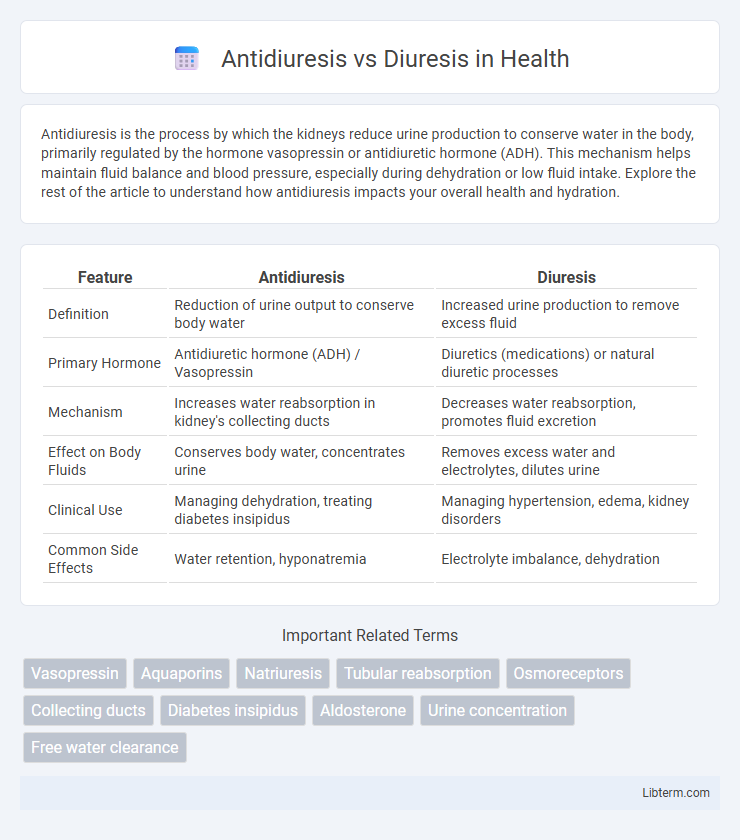Antidiuresis is the process by which the kidneys reduce urine production to conserve water in the body, primarily regulated by the hormone vasopressin or antidiuretic hormone (ADH). This mechanism helps maintain fluid balance and blood pressure, especially during dehydration or low fluid intake. Explore the rest of the article to understand how antidiuresis impacts your overall health and hydration.
Table of Comparison
| Feature | Antidiuresis | Diuresis |
|---|---|---|
| Definition | Reduction of urine output to conserve body water | Increased urine production to remove excess fluid |
| Primary Hormone | Antidiuretic hormone (ADH) / Vasopressin | Diuretics (medications) or natural diuretic processes |
| Mechanism | Increases water reabsorption in kidney's collecting ducts | Decreases water reabsorption, promotes fluid excretion |
| Effect on Body Fluids | Conserves body water, concentrates urine | Removes excess water and electrolytes, dilutes urine |
| Clinical Use | Managing dehydration, treating diabetes insipidus | Managing hypertension, edema, kidney disorders |
| Common Side Effects | Water retention, hyponatremia | Electrolyte imbalance, dehydration |
Introduction to Antidiuresis and Diuresis
Antidiuresis is the physiological process by which the kidneys conserve water, reducing urine output to maintain body fluid balance. Diuresis refers to increased urine production and excretion, often stimulated by substances like diuretics or conditions such as high fluid intake. These mechanisms play critical roles in regulating hydration, electrolyte balance, and blood pressure homeostasis.
Definition of Antidiuresis
Antidiuresis refers to the physiological process that reduces urine production by promoting water reabsorption in the kidneys, primarily mediated by the hormone vasopressin (antidiuretic hormone, ADH). This mechanism conserves body water, resulting in concentrated urine and maintaining fluid balance during dehydration or low blood volume. In contrast, diuresis involves increased urine output, often triggered by substances like diuretics or conditions that inhibit water reabsorption in renal tubules.
Definition of Diuresis
Diuresis refers to the increased production and excretion of urine by the kidneys, often influenced by factors such as fluid intake, medications, or medical conditions. This process helps regulate the body's fluid balance, electrolyte levels, and blood pressure through the removal of excess water and solutes. Antidiuresis, by contrast, is the reduction in urine output, typically mediated by hormones like vasopressin to conserve water in the body.
Physiological Mechanisms Behind Antidiuresis
Antidiuresis is primarily regulated by the hormone vasopressin (antidiuretic hormone, ADH), which increases water reabsorption in the kidney's collecting ducts by promoting the insertion of aquaporin-2 channels into the tubular membrane. This mechanism reduces urine volume and conserves body water, maintaining plasma osmolarity and blood pressure. In contrast, diuresis involves decreased ADH activity, leading to reduced water reabsorption and increased urine output to eliminate excess fluids and solutes.
Physiological Mechanisms Behind Diuresis
Diuresis involves the increased production and excretion of urine primarily regulated by renal function and hormones such as antidiuretic hormone (ADH) and aldosterone. The physiological mechanism behind diuresis includes the inhibition of ADH release, which reduces water reabsorption in the kidney's collecting ducts, leading to greater urine output and decreased blood volume. In contrast, antidiuresis promotes water retention by enhancing ADH activity, facilitating water reabsorption and conserving body fluids.
Key Hormones Involved
Antidiuresis primarily involves the hormone vasopressin (antidiuretic hormone, ADH), which promotes water reabsorption in the kidneys, reducing urine output. In contrast, diuresis is often mediated by hormones such as atrial natriuretic peptide (ANP) and aldosterone inhibitors, which decrease water and sodium reabsorption, increasing urine production. The balance between these hormones regulates fluid homeostasis and maintains blood pressure.
Causes and Triggers of Antidiuresis
Antidiuresis is primarily triggered by the release of antidiuretic hormone (ADH), also known as vasopressin, which is stimulated by high plasma osmolality or low blood volume, signaling the kidneys to retain water and concentrate urine. Causes of antidiuresis include dehydration, hemorrhage, and conditions like syndrome of inappropriate antidiuretic hormone secretion (SIADH) where excessive ADH leads to water retention. In contrast, diuresis involves increased urine production typically caused by factors such as high fluid intake, diuretic medications, or conditions like diabetes insipidus where ADH function is impaired or insufficient.
Causes and Triggers of Diuresis
Diuresis is primarily triggered by factors such as increased fluid intake, consumption of diuretic substances like caffeine or alcohol, and the physiological response to certain medications such as loop diuretics or thiazides. Hormonal changes involving decreased antidiuretic hormone (ADH) secretion also prompt the kidneys to excrete more water, leading to diuresis. Conversely, antidiuresis occurs when elevated ADH levels stimulate water reabsorption in the renal tubules, reducing urine output.
Clinical Significance and Disorders
Antidiuresis involves the kidney's retention of water, primarily regulated by the hormone vasopressin, crucial for maintaining body fluid balance and preventing dehydration, whereas diuresis is the increased production and excretion of urine, often induced by diuretics or pathological conditions such as diabetes insipidus. Clinically, disorders of antidiuresis like Syndrome of Inappropriate Antidiuretic Hormone Secretion (SIADH) lead to water retention and hyponatremia, while conditions causing excessive diuresis, including diabetes mellitus and certain kidney diseases, result in dehydration and electrolyte imbalances. Understanding these mechanisms is vital for diagnosing and managing fluid and electrolyte disorders in patients with heart failure, renal impairment, or endocrine abnormalities.
Comparative Summary: Antidiuresis vs. Diuresis
Antidiuresis involves the kidney's reabsorption of water, reducing urine volume and concentrating urine, primarily regulated by antidiuretic hormone (ADH). Diuresis promotes increased urine output through decreased water reabsorption, often induced by diuretic medications or physiological conditions. The key difference lies in fluid balance regulation, with antidiuresis conserving body water and diuresis facilitating excess fluid elimination.
Antidiuresis Infographic

 libterm.com
libterm.com